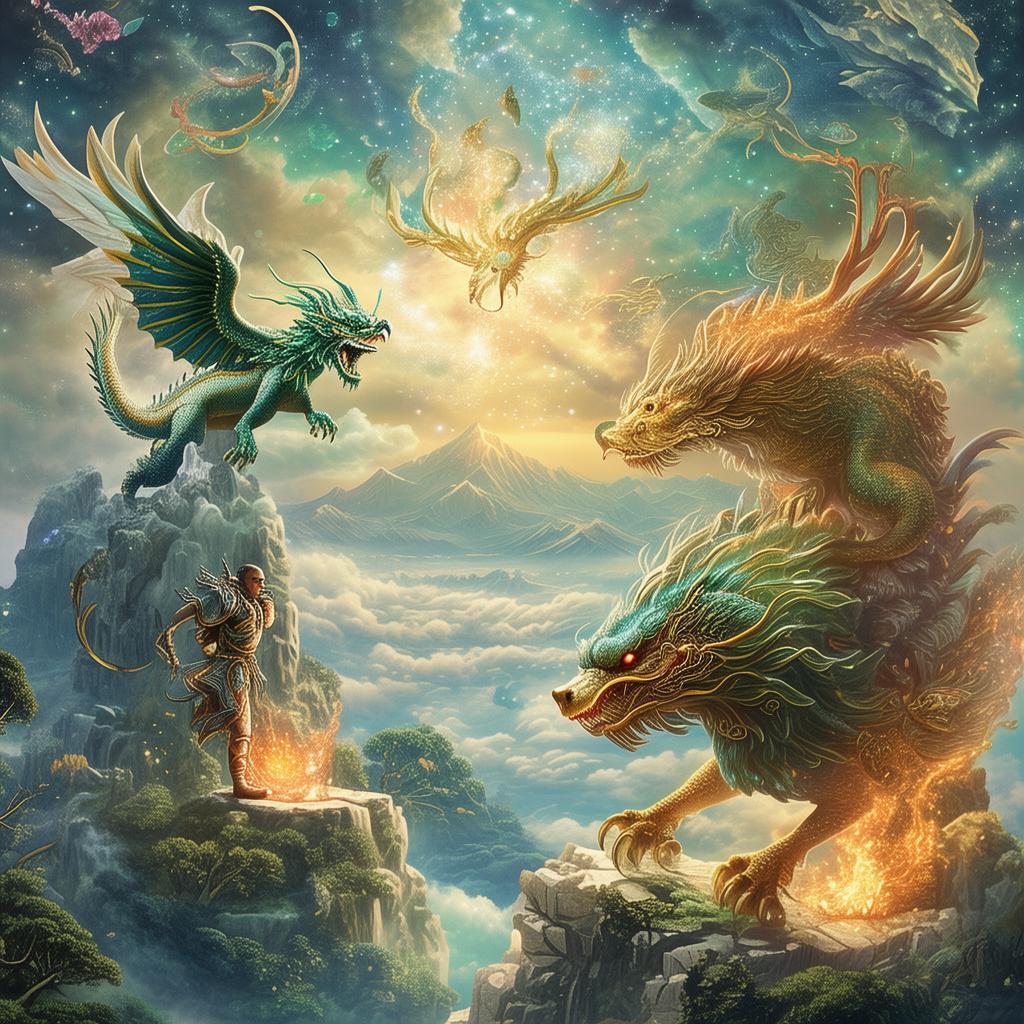Whispers of Fenrir: The Labyrinth of Loyalty
In the heart of Asgard, where the gods walked freely among men and monsters, there lived a creature of legend, a wolf of immense strength and cunning. Fenrir, known as the Lycanthrope, was both feared and revered. His loyalty was as fickle as his fur, and his love was as fierce as the storms that roared across the sky. But it was not his brute strength that made him truly remarkable—it was the depth of his emotion and the complexity of his choices.
Once, in the ancient days when the gods were young and the world was new, Fenrir had been the loyal hound of Odin, the Allfather. Together, they had faced countless trials, and Fenrir's unwavering devotion had been the backbone of their partnership. Yet, as the world grew old, the gods had grown weary of the wolf's power. They foresaw a future where Fenrir would turn on them, as his kin had done to countless others before him. To prevent this, they bound Fenrir with a magical chain, the Haddad's Lock, and locked him away in a deep, dark pit, far from the world above.
But time has a way of healing even the deepest wounds, and Fenrir's spirit grew weary of his eternal slumber. One fateful day, the gods' chains gave way, and Fenrir emerged from his pit, more powerful and determined than ever. Yet, his heart remained bound to the gods he had served, and he sought to understand the nature of their enmity towards him.
As Fenrir roamed the world, he encountered a young woman named Freyja, the goddess of love and beauty. Her eyes sparkled with the light of the morning sun, and her smile was as warm as the hearthfire. It was in her presence that Fenrir felt a strange and powerful emotion, a love so intense that it seemed to consume him from the inside.

Freyja, in turn, was drawn to the wolf, seeing in him the strength and loyalty she had always admired. She knew of the gods' chains and the prophecy that Fenrir would bring destruction upon the world. Yet, her heart told her that love could overcome even the darkest prophecies.
As Fenrir and Freyja's bond grew, the gods of Asgard took notice. They saw the power of love in a creature that had once been their greatest threat. Odin, the Allfather, knew that the time had come to make a choice. Would he allow his son Balder, who had grown to love Fenrir as a brother, to be betrayed by his own kind? Would he stand by and watch as the bonds of love between Fenrir and Freyja could either save or destroy the world?
In the depths of the labyrinth beneath Asgard, where the gods' secrets were kept, a contest was set to determine the fate of Fenrir and the world. The labyrinth was filled with illusions and tricks, and only one could emerge victorious: the one whose loyalty was truest.
Fenrir, with Freyja by his side, entered the labyrinth, their hearts united in a bond that defied all odds. They faced the illusions of love and hate, of trust and betrayal, and they navigated the treacherous paths with a strength that came from the depth of their love for one another.
As they reached the heart of the labyrinth, Fenrir was confronted with a choice: to follow the path of loyalty to his kind or to honor the love he had found in Freyja. In that moment, he knew that the gods had given him a second chance, a chance to prove his worth and the true nature of his heart.
With a roar that shook the very earth, Fenrir broke the Haddad's Lock, setting him free from the constraints of his past. He faced the gods, who now stood before him, not as his enemies, but as the creators of his new destiny.
Odin stepped forward, his eyes reflecting the weight of his decision. "Fenrir," he said, his voice deep and resonant, "you have proven that love and loyalty are not mutually exclusive. You have chosen to stand with Freyja, and by doing so, you have chosen the path of peace and understanding."
With the gods' blessing, Fenrir and Freyja returned to the world above, their love as strong as the will of the gods. Fenrir was no longer a creature of prophecy and destruction, but a symbol of the enduring power of love and the possibility of redemption.
The gods, in their wisdom, saw that Fenrir's story was one that could inspire the world. They allowed him to remain free, to live among men and monsters, to be a reminder of the power of love and the possibility of change.
And so, the legend of Fenrir lived on, a tale of love and loyalty that would be told for generations, a reminder that even the darkest prophecies could be overcome by the light of love.
✨ Original Statement ✨
All articles published on this website (including but not limited to text, images, videos, and other content) are original or authorized for reposting and are protected by relevant laws. Without the explicit written permission of this website, no individual or organization may copy, modify, repost, or use the content for commercial purposes.
If you need to quote or cooperate, please contact this site for authorization. We reserve the right to pursue legal responsibility for any unauthorized use.
Hereby declared.









